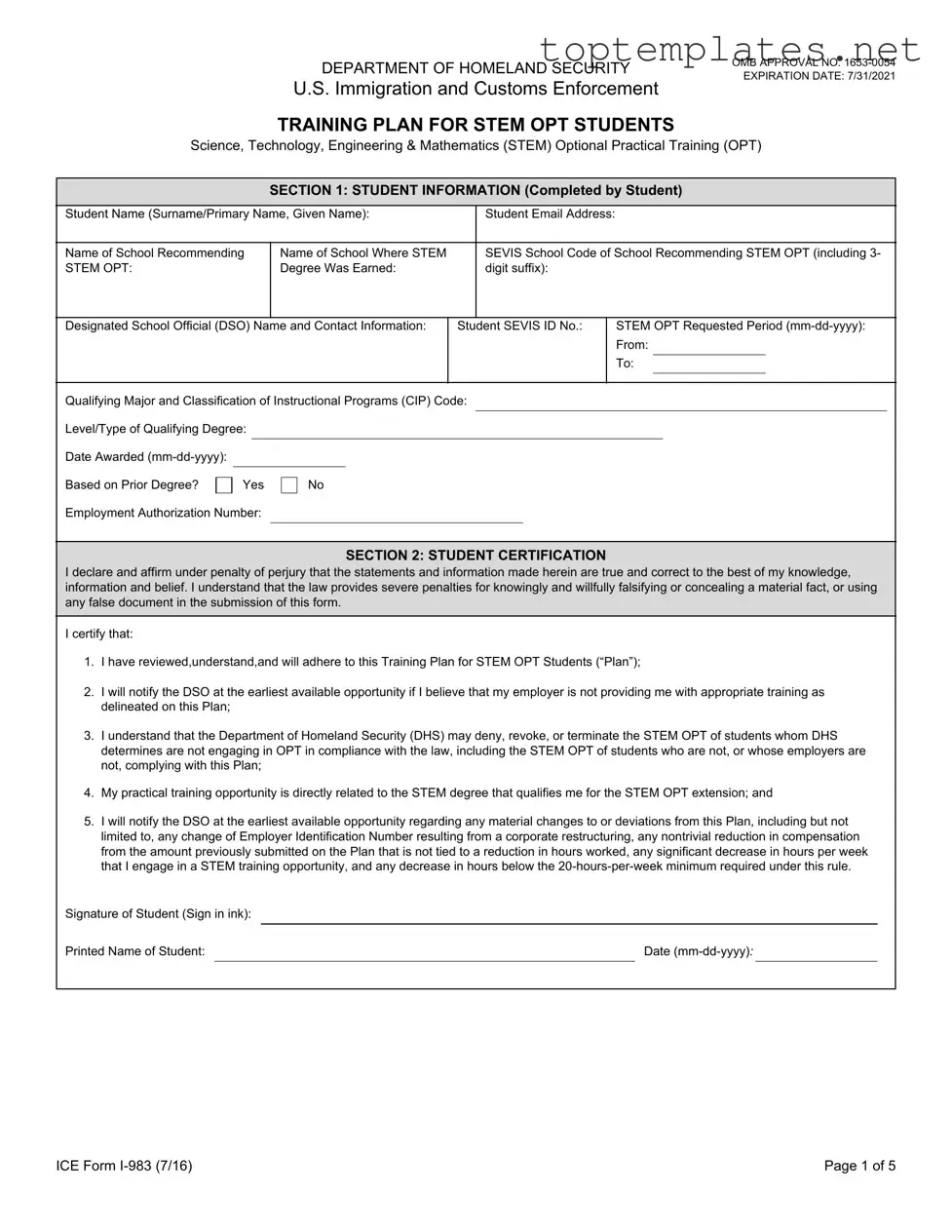Free ICE I-983 PDF Form
Stepping into the world of practical training opportunities in the United States represents a significant stride forward for international students, especially those on an F-1 visa in the Science, Technology, Engineering, and Mathematics (STEM) fields. At the heart of this exciting journey is the Form I-983, a critical document overseen by the U.S. Immigration and Customs Enforcement (ICE). This form is not just a piece of paper; it's a robust plan outlining how the student's practical training will enrich their academic learning with real-world experience. The I-983 form requires detailed input from both the student and their employer, ensuring that the training provided aligns with the educational objectives of the student's degree program. Key sections demand information on the employer’s commitment to developing the student's knowledge and skills, alongside mechanisms for evaluating the student's progress. Furthermore, it plays a pivotal role in maintaining compliance with the STEM Optional Practical Training (OPT) extension regulations, making it an essential stop on the student’s path to gaining practical experience in their field of study. Understanding the nuances and completing this form with precision is crucial for both students and employers as they navigate the intricacies of blending academic theory with practical work experience.
Sample - ICE I-983 Form

DEPARTMENT OF HOMELAND SECURITY
U.S. Immigration and Customs Enforcement
TRAINING PLAN FOR STEM OPT STUDENTS
OMB APPROVAL NO.
Science, Technology, Engineering & Mathematics (STEM) Optional Practical Training (OPT)
SECTION 1: STUDENT INFORMATION (Completed by Student)
Student Name (Surname/Primary Name, Given Name): |
|
Student Email Address: |
|
|
|
|
|
|
|||
|
|
|
|
|
|
|
|
|
|
|
|
Name of School Recommending |
|
Name of School Where STEM |
|
SEVIS School Code of School Recommending STEM OPT (including 3- |
|||||||
STEM OPT: |
|
Degree Was Earned: |
|
digit suffix): |
|
|
|
|
|
|
|
|
|
|
|
|
|
|
|
|
|
||
Designated School Official (DSO) Name and Contact Information: |
Student SEVIS ID No.: |
|
STEM OPT Requested Period |
|
|||||||
|
|
|
|
|
|
From: |
|||||
|
|
|
|
|
|
To: |
|||||
|
|
|
|
|
|
|
|
|
|
|
|
Qualifying Major and Classification of Instructional Programs (CIP) Code: |
|
|
|
|
|
|
|||||
Level/Type of Qualifying Degree: |
|
|
|
|
|
|
|
|
|
|
|
Date Awarded
Based on Prior Degree? |
Yes |
Employment Authorization Number:
No
SECTION 2: STUDENT CERTIFICATION
I declare and affirm under penalty of perjury that the statements and information made herein are true and correct to the best of my knowledge, information and belief. I understand that the law provides severe penalties for knowingly and willfully falsifying or concealing a material fact, or using any false document in the submission of this form.
I certify that:
1.I have reviewed,understand,and will adhere to this Training Plan for STEM OPT Students (“Plan”);
2.I will notify the DSO at the earliest available opportunity if I believe that my employer is not providing me with appropriate training as delineated on this Plan;
3.I understand that the Department of Homeland Security (DHS) may deny, revoke, or terminate the STEM OPT of students whom DHS determines are not engaging in OPT in compliance with the law, including the STEM OPT of students who are not, or whose employers are not, complying with this Plan;
4.My practical training opportunity is directly related to the STEM degree that qualifies me for the STEM OPT extension; and
5.I will notify the DSO at the earliest available opportunity regarding any material changes to or deviations from this Plan, including but not limited to, any change of Employer Identification Number resulting from a corporate restructuring, any nontrivial reduction in compensation from the amount previously submitted on the Plan that is not tied to a reduction in hours worked, any significant decrease in hours per week that I engage in a STEM training opportunity, and any decrease in hours below the
Signature of Student (Sign in ink):
Printed Name of Student: |
|
Date |
ICE Form |
Page 1 of 5 |

SECTION 3: EMPLOYER INFORMATION (Completed by Employer)
Employer Name: |
|
|
Street Address: |
|
Suite: |
|
|
|
||
|
|
|
|
|
|
|
|
|
||
Employer Website URL: |
|
|
City: |
State: |
|
ZIP Code: |
|
|||
|
|
|
|
|
|
|
||||
Employer ID Number (EIN): |
Number of |
North American Industry Classification System (NAICS) Code: |
|
|||||||
|
Employees in U.S.: |
|
|
|
|
|
|
|
|
|
|
|
|
|
|
|
|
|
|
|
|
OPT Hours Per Week (must be at least 20 |
Compensation: |
|
|
|
|
|
|
|
|
|
hours/week): |
A. Salary Amount and Frequency: |
|
|
|
|
|
|
|
||
|
|
|
|
|
|
|
||||
|
B. Other Compensation (Type and Estimated Amount or Value): |
|
|
|
|
|
|
|||
Start Date of Employment |
|
|
|
|
|
|
||||
|
1. |
|
|
|
|
|
|
|
|
|
|
2. |
|
|
|
|
|
|
|
|
|
|
3. |
|
|
|
|
|
|
|
|
|
|
4. |
|
|
|
|
|
|
|
|
|
|
|
|
|
|
|
|
|
|
|
|
SECTION 4: EMPLOYER CERTIFICATION
I declare and affirm under penalty of perjury that the statements and information made herein are true and correct to the best of my knowledge, information and belief. I understand that the law provides severe penalties for knowingly and willfully falsifying or concealing a material fact, or using any false document in the submission of this form.
I certify on behalf of the employer that this Training Plan for STEM OPT Students (“Plan”) is approved and that:
1.I have reviewed and understand this Plan, and I will ensure that the supervising Official follows this Plan;
2.I will notify the DSO at the earliest available opportunity regarding any material changes to this Plan, including but not limited to, any change of Employer Identification Number resulting from a corporate restructuring, any reduction in compensation from the amount previously submitted on the Plan that is not tied to a reduction in hours worked, any significant decrease in hours per week that a student engages in a STEM training opportunity, and any decrease in hours below the
3.Within five business days of the termination or departure of the student during the authorized period of OPT, I will report such termination or departure to the DSO (Note: business days do not include federal holidays or weekend days; and an employer shall consider a student to have departed when the employer knows the student has left the practical training opportunity, or when the student has not reported for practical training for a period of five consecutive business days without the consent of the employer); and
4.I will adhere to all applicable regulatory provisions that govern this program (see 8 CFR Part 214), which include, but are not limited to, the following:
a.The student’s practical training opportunity is directly related to the STEM degree that qualifies the student for the STEM OPT extension, and the position offered to the student achieves the objectives of his or her participation in this training program;
b.The student will receive
c.The employer has sufficient resources and personnel to provide the specified training program set forth in this Plan, and the employer is prepared to implement that program, including at the location(s) identified in this Plan;
d.The student on a STEM OPT extension will not replace a full- or
e.The training conducted pursuant to this Plan complies with all applicable Federal and State requirements relating to employment.
Note: DHS may, at its discretion, conduct a site visit of the employer to ensure that program requirements are being met, including that the employer possesses and maintains the ability and resources to provide structured and guided
Signature of Employer Official with Signatory Authority (Sign in ink):
Printed Name and Title of Employer Official with Signatory Authority:
Date |
|
Printed Name of Employing Organization: |
ICE Form |
Page 2 of 5 |

SECTION 5: TRAINING PLAN FOR STEM OPT STUDENTS (Completed by Student and Employer)
Student Name (Surname/Primary Name, Given Name):
Employer Name:
EMPLOYER SITE INFORMATION
Site Name:
Name of Official:
Official's Email:
Site Address (Street, City, State, ZIP):
Official's Title:
Official's Phone Number:
Note: for the remaining fields in this section, employers who already have an
Student Role: Describe the student's role with the employer and how that role is directly related to enhancing the student's knowledge obtained through his or her qualifying STEM degree.
Goals and Objectives: Describe how the assignment(s) with the employer will help the student achieve his or her specific objectives for
Employer Oversight: Explain how the employer provides oversight and supervision of individuals filling positions such as that being filled by the named
Measures and Assessments: Explain how the employer measures and confirms whether individuals filling positions such as that being filled by the named
ICE Form |
Page 3 of 5 |

Additional Remarks (optional): Provide additional information pertinent to the Plan.
SECTION 6: EMPLOYER OFFICIAL CERTIFICATION
I declare and affirm under penalty of perjury that the statements and information made herein are true and correct to the best of my knowledge, information and belief. I understand that the law provides severe penalties for knowingly and willfully falsifying or concealing a material fact, or using any false document in the submission of this form.
Employer Official with Signatory Authority - I certify that:
1.I have reviewed, understand, and will follow this Training Plan for STEM OPT Students (Plan);
2.I will conduct the required periodic evaluations of the student;*
3.I will adhere to all applicable regulatory provisions that govern this program (see 8 CFR Part 214.2(f)(10)(ii)); and
4.I will notify the DSO regarding any material changes to or material deviations from this Plan at the earliest available opportunity, including if I believe the student is not receiving appropriate training as delineated in this Plan.
Signature of Employer Official with Signatory Authority (Sign in ink):
Printed Name and Title of Employer Official with Signatory Authority:
Date
PRIVACY ACT STATEMENT
AUTHORITIES: Section 101(a)(15)(F) of the Immigration and Nationality Act of 1952, as amended (INA), 8 U.S.C. 1101(a)(15)(F), Section 641 of the Illegal Immigration Reform and Immigrant Responsibility Act of 1996 (IIRIRA), Pub. L.
PURPOSE: The information collection on this form is used to assist in the administration of the STEM Optional Practical Training (OPT) extension so that Designated School Officials (DSO) can properly recommend the Student for and review and help coordinate his or her STEM optional practical training opportunity.
ROUTINE USES: The information collected on this form may be shared with: the individuals who signed the Plan, relevant DSOs acting as liaisons with the DHS, Federal, State, local, or foreign government entities for law enforcement purposes, Members of Congress in response to requests on the Student’s behalf, or as otherwise authorized pursuant to its published Privacy Act system of records notice - Privacy Act of 1974: U.S.
Immigration and Customs Enforcement,
DISCLOSURE: The information you provide is voluntary. However, failure to provide the information requested on this form may delay or prevent participation in a STEM OPT opportunity.
PAPERWORK REDUCTION ACT
The public reporting burden for this collection of information is estimated to average 7.5 hours per response, including time required for searching existing data sources, gathering the necessary documentation, providing the information and/or documents required, and reviewing the final collection. You do not have to supply this information unless this collection displays a currently valid Office of Management and Budget (OMB) control number. If you have comments on the accuracy of this burden estimate and/or recommendations for reducing it, send them to: U.S.Immigration and Customs Enforcement, Office of Policy, 500 12th Street SW, Washington, D.C. 20536
*See evaluation forms that follow for student’s first evaluation, to occur before the one year anniversary of the start date of the student’s STEM OPT employment authorization, and final program evaluation.
ICE Form |
Page 4 of 5 |

EVALUATION ON STUDENT PROGRESS
Provide a
Range of Evaluation Dates: From |
|
To |
|
|
Signature of Student (Sign in ink):
Printed Name of Student: |
|
Date |
Signature of Employer Official with Signatory Authority (Sign in ink):
Printed Name of Employer Official with Signatory Authority: |
|
Date |
FINAL EVALUATION ON STUDENT PROGRESS
Provide a
Range of Evaluation Dates: From |
|
To |
|
|
Signature of Student (Sign in ink):
Printed Name of Student: |
|
Date |
Signature of Employer Official with Signatory Authority (Sign in ink):
Printed Name of Employer Official with Signatory Authority: |
|
Date |
ICE Form |
Page 5 of 5 |
File Specs
| Fact Name | Description |
|---|---|
| Purpose of the Form | The ICE Form I-983 is designed for students on a STEM OPT extension to outline their training plan. It requires detailed information about the proposed employment, ensuring the opportunity is directly related to the student's major area of study. |
| Parties Involved | This form involves collaboration between the student, employer, and the student's educational institution. It ensures all parties agree on the terms of the STEM OPT extension and the educational benefits derived therefrom. |
| Reporting Requirements | Students and employers must report progress and any material changes to the training plan outlined in the I-983 to the student's educational institution throughout the duration of the STEM OPT period. |
| Governing Law(s) | The I-983 form is governed by regulations set forth by the U.S. Department of Homeland Security and aligns with the guidelines of the Student and Exchange Visitor Program (SEVP). |
Steps to Filling Out ICE I-983
Completing the ICE I-983 form is a critical step in ensuring compliance with the requirements of certain visa programs. This document plays a vital role in the training plan for STEM OPT students, opening pathways for practical learning and professional development. The process involves careful attention to detail and precise communication between the student and their employer to accurately reflect the agreed training elements. By following these step-by-step instructions, you will be better equipped to provide the necessary information and facilitate a smooth approval process.
- Start by gathering all required information, including the student’s name, address, SEVIS number, and the employer’s name, address, and EIN (Employer Identification Number).
- Fill in the student’s section with personal details like name, address, date of birth, and SEVIS number. Ensure the accuracy of this information to avoid complications.
- Complete the employer information section. This includes the legal name of the company, the EIN, and the full address. Double-check the EIN to prevent processing delays.
- Detail the formal training plan. This should cover the specific goals for the STEM OPT period, how those goals will be achieved, and the methods of evaluating the student’s progress. Be as specific as possible to clearly articulate the training objectives and methods.
- Discuss and define the terms and conditions of employment, including the salary, hours, and any other compensation or benefits. Both the student and employer must agree to these terms.
- Signatures are crucial. The form must be signed by both the student and the employer’s official representative. Make sure these signatures are included on the form to validate the agreement.
- Review the form meticulously before submission. Both the student and the employer should check for any errors or missing information to ensure everything is correct and complete.
- Submit the form according to the instructions provided by your designated school official (DSO) or as directed by the relevant authorities. Submission procedures may vary, so it’s important to follow the specific guidelines applicable to your situation.
Once the ICE I-983 form is successfully submitted, the student and employer have taken a significant step towards fulfilling the STEM OPT program requirements. It's important to keep a copy of the completed form for records and future reference. Following the submission, ongoing reporting and evaluation will be required to maintain compliance with the program's regulations. This collaborative effort between the student and employer showcases a commitment to practical, hands-on learning and professional growth within the STEM fields.
Discover More on ICE I-983
What is the ICE I-983 form?
The ICE I-983 form, also known as the "Training Plan for STEM OPT Students," is a document required by the U.S. Immigration and Customs Enforcement (ICE) for students who are applying for a 24-month extension of their Optional Practical Training (OPT) under the STEM (Science, Technology, Engineering, and Mathematics) category. This form is designed to ensure that the STEM OPT experience is educational, and it outlines the training plan, including goals and objectives, methods of oversight, and measures of evaluation.
Who needs to complete the ICE I-983 form?
Both the STEM OPT student and their employer must complete the ICE I-983 form. The student starts the process by filling out their portion of the form and then passes it to their employer to complete the employer sections. It's important for both parties to collaborate on this document, as it requires detailed information about the training program that the student will be undertaking during their STEM OPT period.
When should the ICE I-983 form be submitted?
The ICE I-983 form must be submitted to the student's designated school official (DSO) before the student can apply for the STEM OPT extension with the U.S. Citizenship and Immigration Services (USCIS). The form should be provided to the DSO at least 10 days before the current OPT expires to avoid any lapses in employment authorization.
What happens if there are changes to the training plan?
If there are any material changes to the original training plan, such as changes in the employer’s EIN, a reduction in compensation not tied to a reduction in hours worked, or significant changes in the employer’s commitments or the student’s learning objectives, the student and employer must complete a new ICE I-983 form reflecting these changes and submit it to the DSO within 10 days of the change.
Can multiple employers fill out the ICE I-983 form for one student?
Yes, if a STEM OPT student is employed by more than one employer, each employer must fill out and sign a separate ICE I-983 form. Each training opportunity must meet the program's requirements, including being directly related to the student’s qualifying STEM degree.
Is the ICE I-983 form required for unpaid internships?
Yes, the ICE I-983 form is required for both paid and unpaid internships, as long as the position meets the requirements for STEM OPT and the student gains practical training through their work. However, all OPT employment, including STEM OPT, must comply with labor laws and regulations, which ordinarily do not permit unpaid internships in certain circumstances.
What are the consequences of failing to properly complete the ICE I-983 form?
Failing to properly complete or timely submit the ICE I-983 form can lead to the denial of the STEM OPT extension application, the revocation of current OPT, or other impacts on the student’s immigration status. It is critical for both students and employers to accurately complete the form and comply with all reporting requirements.
Where can I find the ICE I-983 form?
You can find the ICE I-983 form on the official website of the U.S. Immigration and Customs Enforcement (ICE) or through your school’s designated school official (DSO). It's important to ensure you're using the most current version of the form.
How do I submit the completed ICE I-983 form?
The completed ICE I-983 form should not be sent directly to ICE or USCIS. Instead, the student must submit it to their designated school official (DSO), who will review the form for completeness and accuracy before the student applies for the STEM OPT extension with USCIS. The DSO will then keep the form on file.
Are there any sections of the ICE I-983 form that are especially important to pay attention to?
While every section of the ICE I-983 form is important, special attention should be paid to the training plan section, where the employer must describe how the training is directly related to the student's qualifying STEM degree and the specific goals and objectives of the training. Misrepresentation or inaccuracies in this section can result in significant delays or the denial of the STEM OPT extension.
Common mistakes
When completing the ICE I-983 form, designed for STEM OPT students and employers to articulate formal training plans, individuals often encounter various pitfalls. Attention to detail and a thorough understanding of the requirements can significantly streamline the approval process. Below are seven common mistakes people frequently make when filling out this form:
Failing to fully complete every required section. Each part of the form serves a specific purpose and provides critical information. Leaving sections blank may lead to delays or denials.
Providing inaccurate employer information. The employer's EIN (Employer Identification Number), name, and address must be correct and match official documents.
Misunderstanding the training plan's objectives. The form requires a detailed description of the training program, including specific goals, a timeline, and methods of oversight and assessment. Vague or generic descriptions are insufficient.
Incorrect dates. Dates must be accurate and reflect the actual training period. Incorrect or unrealistic start and end dates can cause unnecessary complications.
Not obtaining the necessary signatures. The form requires signatures from both the student and the employer's official representative. Missing signatures can invalidate the entire submission.
Mismatching details with the student's Form I-20. Any information regarding the student's employment and training opportunity must align with what is recorded on Form I-20.
Overlooking the evaluation sections. Initial and final evaluations by the student's employer are critical components of the training plan. These sections must be completed accurately and timely as part of the STEM OPT extension requirements.
Properly completing the ICE I-983 form requires attention to detail and an understanding of the form's requirements. By avoiding these common mistakes, students and employers can facilitate a smoother process for obtaining or extending a STEM OPT authorization.
Documents used along the form
Completing the ICE Form I-983 is a crucial step for employers and students involved in the science, technology, engineering, and mathematics (STEM) Optional Practical Training (OPT) extension. However, it is often just one piece of a larger puzzle. Several other forms and documents frequently accompany the I-983 to ensure compliance with United States Immigration and Customs Enforcement (ICE) and the United States Citizenship and Immigration Services (USCIS) requirements. These additional forms and documents, each with its own purpose and requirements, play vital roles in maintaining legal status and facilitating the OPT extension process.
- Form I-765: Application for Employment Authorization. This form is used by students seeking to obtain an Employment Authorization Document (EAD) to legally work in the U.S. under the OPT program.
- Form I-20: Certificate of Eligibility for Nonimmigrant Student Status. Updated by the Designated School Official (DSO), this form endorses the student's participation in the OPT and STEM OPT extension and verifies the student’s academic status and eligibility.
- Passport: A valid passport is needed to prove the student's identity and nationality. It must be valid for at least six months beyond the period of intended stay in the United States.
- Visa: A valid F-1 visa allows a student to enter and remain in the U.S. for the duration of their academic program plus any authorized training period.
- Form DS-160: Online Nonimmigrant Visa Application. Required for first-time F-1 visa applicants or those renewing their visas, detailing personal information and the purpose of travel.
- Form I-94: Arrival/Departure Record. This document tracks the student's arrivals and departures from the U.S. It is often retrieved electronically and provides evidence of the student's legal entry into the country.
- Proof of Financial Resources: Documents demonstrating the student's ability to financially support themselves during their stay in the U.S., which may include bank statements, scholarships, or sponsorship letters.
- Employment Offer Letter: A letter from the employer offering the student a position under the OPT program. It should include details such as the job title, duties, salary, and the start and end dates of employment.
Together, these documents create a comprehensive package that illustrates a student's eligibility and readiness for the OPT and STEM OPT extension programs. It's essential for both students and employers to gather, complete, and submit these forms accurately and timely to adhere to immigration laws and maintain the student's legal status in the U.S. Understanding each document’s purpose and requirements facilitates a smoother process for gaining employment authorization and contributes to the overall success of the student's academic and professional endeavors in the United States.
Similar forms
The Form I-9, Employment Eligibility Verification, shares similarities with the ICE I-983 form in its fundamental purpose of verifying eligibility. Where the I-9 ensures that individuals are authorized to work in the United States, the I-983 form focuses on ensuring that students under the STEM OPT extension are engaged in practical training that directly relates to their area of study and supports their educational experiences.
Form DS-160, Online Nonimmigrant Visa Application, similarly requires detailed personal information and background as part of the visa application process. Both documents are integral in assessing the eligibility and intent of individuals looking to enter or remain in the U.S. under specific conditions, with the I-983 specifically focusing on educational and practical training components.
Like the I-983 form, the Form I-129, Petition for a Nonimmigrant Worker, calls for thorough information about an employer or sponsor and the nature of the employment or training. The focus on details about the offered position, including duties and qualifications, mirrors the I-983’s emphasis on the practical training plan, objectives, and the beneficiary's progress.
The H-1B Visa Application shares an emphasis on educational and occupational qualifications relevant to the requested visa category, much like the I-983 form underscores the alignment of a student’s STEM OPT extension activities with their field of study. Each document plays a critical role in establishing the qualifications and eligibility of applicants for their respective programs, requiring detailed submissions regarding one's background, education, and proposed activities in the United States.
Dos and Don'ts
Filling out the ICE I-983 form is a step-by-step process that requires careful attention to detail. To ensure that this document is completed accurately and effectively, it is critical to follow specific guidelines. Below are the dos and don'ts that individuals should keep in mind while working on the ICE I-983 form.
Do:
- Ensure all sections of the form are completed in a clear and legible manner. This will prevent any misunderstandings or delays in the processing of the form.
- Provide accurate and up-to-date information about the training plan, including the goals and how the program will enhance the student’s career.
- Discuss the form with your employer or program sponsor to verify that all the information is correct and reflects the actual training program.
- Double-check the Employer Identification Number (EIN) and the address of the employer, as these are critical for the identification and communication process.
- Sign and date the form in the designated areas to confirm the authenticity and agreement with the provided information.
- Keep a copy of the completed form for personal records. This will be helpful for future reference or in case of any discrepancies.
- Seek assistance if there are any sections of the form that are unclear. It’s better to ask for help than to submit incorrect information.
Don't:
- Leave any sections blank. If a section does not apply, it’s recommended to mark it as “N/A” (Not Applicable) rather than leaving it empty.
- Guess on details or provide false information. Accuracy is essential to avoid issues with legal status or program eligibility.
- Forget to update the form if any changes occur during the training period. It’s important to keep all provided information current.
- Use abbreviations or acronyms that are not widely recognized. Spell out names and terms to ensure clarity.
- Submit the form without reviewing it for errors. A simple oversight could lead to unnecessary complications.
- Overlook the requirement for the employer or program sponsor’s signatures. Their endorsement is crucial for the validity of the form.
- Delay the submission of the form beyond the deadline. Timeliness is key to maintaining compliance with program requirements.
Misconceptions
It's only for the student's benefit: While it appears to be for the student, the ICE I-983 form plays a crucial role in ensuring that both the employer and the educational institution meet the requirements of the STEM OPT extension. This mutual responsibility helps maintain the integrity of this program.
It's a one-time form: Many think that once the ICE I-983 form is submitted, it's done. In fact, updates are necessary if any significant changes occur, such as a change in employment, duties, or termination of the training experience.
Employers have no obligations: On the contrary, employers signing the I-983 form agree to several key commitments. These include providing a formal training plan, adhering to labor laws, and directly supervising the student.
It's overly complicated: The form does require detailed information, but it's designed to ensure that the training experience is relevant and beneficial to the student's career development in their STEM field. The detailed instructions provided help both parties fill it out correctly.
Any employer can sign it: Not all employers are eligible. They must be enrolled in the E-Verify program and agree to the terms outlined in the I-983 form, including the training plan's requirements.
No follow-up is required: Students and employers must complete an annual self-evaluation, which is part of the form. This process ensures ongoing compliance with the program's objectives and allows for reflection on the student's progress.
The form guarantees employment: Completing and submitting the ICE I-983 does not guarantee that the student will remain employed for the duration of the STEM OPT. Employment is subject to the employer’s discretion and performance criteria.
Submitting late has no consequences: Timely submission is critical. Failure to submit the form within the required timeframe can result in the loss of STEM OPT status for the student, affecting their ability to work legally in the U.S.
Only STEM field employers are eligible: While the employer must provide a training program related to the student's STEM degree, they don't necessarily need to be a STEM-focused company themselves. The key requirement is that the training offered matches the student's field of study.
Personal information is at risk: Privacy concerns are understandable, but the information requested on the form is necessary for verifying the legitimacy of the training program and ensuring compliance with U.S. immigration laws. Both the school and the employer are expected to handle the information responsibly.
Key takeaways
When filling out and using the ICE I-983 form, which is crucial for STEM OPT students and their employers, it's important to keep several key points in mind to ensure compliance and accuracy. Here's what you need to know:
- Complete Accuracy is Crucial: Every piece of information provided on the I-983 form must be accurate and truthful. Any inaccuracies, no matter how minor they may seem, can lead to delays or complications in the approval process.
- Details of the Training Program: The form requires a detailed description of the training program, including how it relates to the student’s STEM degree. Employers must clearly outline the goals and objectives of the program, ensuring they align with the educational background of the student.
- Employer and Employee Responsibilities: Both parties must fully understand their responsibilities. Employers are responsible for helping with the creation of the training plan and providing a detailed explanation of the direct supervision methods they will use.
- Signatures Are Mandatory: The I-983 form must be signed by both the student and the employer. These signatures are an attestation to the truthfulness and accuracy of the information provided and the commitment to adhere to the program requirements.
- Changes Require Updates: Any significant changes to the training program, such as changes in employment or reductions in compensation, must be reported and could require a new I-983 form to be submitted. It's important to keep the document up-to-date to reflect the current agreement between the student and the employer.
- Annual Evaluations: The form mandates that annual evaluations be conducted to assess the student’s progress within the training program. Both the student and employer are responsible for completing these evaluations, which are critical for maintaining the student’s status.
- Maintain Records: All parties should keep copies of the signed I-983 form and any documentation related to the student’s training experience. These documents may be requested by the government at any time to verify compliance with the program’s requirements.
Properly understanding and utilizing the I-983 form is essential for the success of the STEM OPT extension. Both students and employers benefit from carefully completing the form to ensure a fruitful and regulatory-compliant training experience.
Common PDF Forms
Dekalb County Water Application Online - Residents have the option to request a paper bill or opt for electronic billing through the completion of this form.
Cancel Melaleuca Membership Online - Delineates the specific discounts and privileges customers will forgo upon submitting the form.
Broker Price Opinion Template - Streamlining the valuation process, the form aids in expediting real estate transactions by providing essential data points for swift analysis.
